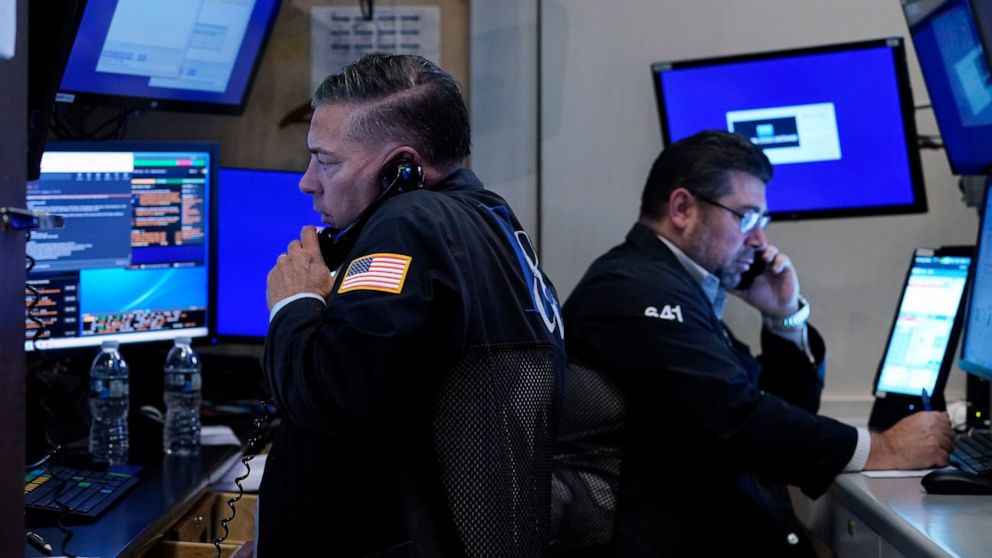US stock indexes open lower on renewed concerns over variant
Stocks are opening lower on Wall Street after the head of a major vaccine maker expressed concern about how effective current jabs will be against the new variant of the coronavirus
NEW YORK — Stocks are opening lower on Wall Street after the head of a major vaccine maker expressed concern about how effective current jabs will be against the new variant of the coronavirus. The S&P 500 gave back 0.6%, the Nasdaq slipped 0.3% and the Dow Jones Industrial Average fell 0.9%. European markets were also modestly lower. The weakness came after the head of Moderna told the Financial Times that he expected that current vaccines would struggle with the omicron variant. Treasury yields fell as investors sought to reduce their exposure to risk, and crude oil prices, which depend on a strong economy, slumped 3.9%.
THIS IS A BREAKING NEWS UPDATE. AP’s earlier story follows below.
NEW YORK (AP) — Global shares mostly slipped Tuesday as investors cautiously weighed how much damage the new omicron coronavirus variant may unleash on the global economy.
Germany’s DAX lost 1.1% to 15,106.35 in afternoon trading. France’s CAC 40 slipped 0.9%, while Britain’s FTSE 100 shed 0.8%. In Asia, Japan’s benchmark Nikkei 225 closed 1.6% lower at 27,821.76, as pessimism over the omicron variant set in. Hong Kong’s Hang Seng also fell 1.6%, while the Shanghai Composite was nearly flat.
U.S. shares were set for a lower open, with the future contract for the Dow industrials down 1% at 34,710.00. S&P 500 futures fell 0.8% after the benchmark index rose 1.3% Monday.
Omicron adds more risk to a global economy already contending with paralyzing uncertainty. The variant appears to spread more easily, and countries around the world have put up barriers to travel in hopes of stemming it.
Travel bans, including decisions by Japan and Israel to bar foreign visitors, threaten to disrupt global business. Global supply chains already gummed up by bottlenecks could be further ensnarled if outbreaks shut down factories, ports and freight yards.
Federal Reserve Chair Jerome Powell says that the appearance of the new variant could slow the U.S. economy and hiring, while also raising uncertainty about inflation.
The recent increase in delta cases and the emergence of the omicron variant “pose downside risks to employment and economic activity and increased uncertainty for inflation,” Powell said Monday in prepared remarks to be delivered to the Senate Banking Committee on Tuesday. The new variant could also worsen supply chain disruptions, he said.
Some analysts think a serious economic downturn, like what happened last year, likely will be averted because many people have been vaccinated. But they also think a return to pre-pandemic levels of economic activity, especially in tourism, has been dramatically delayed.
“Uncertainty from the new omicron variant may seem to bring about higher economic risks for (Asia) at a time where it is shifting towards further reopening,” Yeap Jun Rong, market strategist at IG in Singapore, said of the omicron’s impact on Asia.
China’s manufacturing activity rebounded in November as orders improved and power shortages eased, according to a survey by an industry group and the national statistics agency.
The survey found that a monthly purchasing managers’ index rose to 50.1 from October’s 49.2 on a 100-point scale. The index spent the previous two months below 50, showing decreasing activity. A measure of production rose 3.6 points to 52, reflecting a recovery from power rationing imposed in major manufacturing areas in September.
Besides waiting on more clues about how much economic damage omicron will ultimately do, the market has several big mileposts this week that could swing prices. The headliner is likely Friday’s U.S. jobs report, where economists expect to see an acceleration in hiring by employers during November.
In energy trading, benchmark U.S. crude dropped $2.03 to $67.92 a barrel. It rose $1.80 to $69.95 per barrel on Monday. Brent crude, the international standard, fell $2.29 to $70.93 a barrel.
In currency trading, the U.S. dollar slipped to 112.87 Japanese yen from 113.56 yen. The euro advanced to $1.1365 from $1.1293.
![]()


